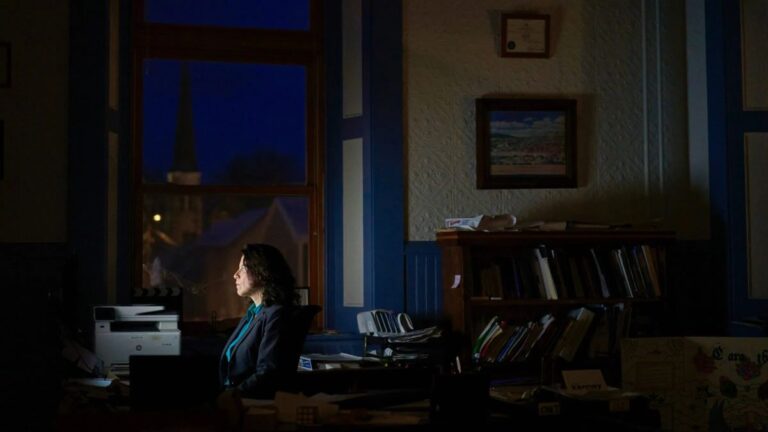Editor’s Note: The following story first appeared in The Maine Monitor’s free environmental newsletter, Climate Monitor, that is delivered to inboxes for every Friday morning. Sign up for the free newsletter to get important environmental news by registering at this link.
Representatives from Canadian mining company Exiro Mineral Corp were in Union and Warren last week to talk about their plans to look for nickel, copper and cobalt near Crawford Pond, a move has already rankled many residents, some of whom turned out to voice their displeasure at meetings last Wednesday and Thursday.
“We need to get out there and put this thing to bed,” said Chris Fierro, who owns property in Warren and Union.
Exiro President, CEO and founder Shastri Ramnath fielded questions from residents, several of whom worried about water contamination and property values. She stressed that mining has changed, and said the company is looking to work with the community, not against it.
“We firmly believe that for any exploration project to be successful, there must be support from local communities,” Ramnath told the crowd. “Our preference is to work in partnership with you. We all use metal every day and rely on technologies that will keep requiring it. We also believe that it is imperative that we find a domestic supply of metal and that local communities share the benefit of successful exploration.”
Ramnath said that it would take years, likely more than a decade, before any type of mining would occur in the area, if at all. The first step is figuring out — initially via aerial surveys — whether the deposit, which was first identified in the 1960’s, is worth excavating. Ramnath said that technology has changed, and that the company believes it goes deeper than was originally shown. (You can find video of the Union meeting here.)
Exiro is a junior mining company, part of a cohort of smaller exploration outfits that identify possible deposits but typically don’t do the mining themselves. Filings show the company was incorporated in 2014 and has sold 3.9 million Canadian dollars ($2.87 million USD) of mining sites in the last two years.
Exiro did not respond to an email or phone call before this newsletter went to (virtual) press.
Exiro is the second Canadian company to publicly test the waters in Maine in the past few years. Wolfden Resources Corp. filed a second application in January to rezone an area east of Mount Katahdin known as Pickett Mountain, the first step in obtaining a mining permit from the Maine Department of Environmental Protection. (The company withdrew its first application after regulators indicated they would reject it.)
If a significant enough deposit is found in Knox County, Ramnath explained, Exiro could outsource the contract, hire the miners itself or be sold to a larger mining company. Any company looking to mine in the area would be required, per Maine law, to do years of background studies on water quality and apply for permits from the Maine Department of Environmental Protection.
“But,” said Ramnath, “any company or investor who’s putting money into these types of activities will not if they believe that communities have been sidelined and not heard.”
Crawford Pond (locally known as Crawford Lake, because of its size) was the subject of much discussion. Ramnath said the company might fly over the pond during exploration, but said Maine law prohibits underwater mining. “Nobody is going to drain the lake,” she said.
Ramnath touted the prospect of well-paying jobs, including “peripheral” work in trucking, nursing, catering and IT infrastructure. “Statistically mineral exploration and mining provides some of the highest paying jobs,” she said.
Not everyone was swayed.
“The jobs that you’re talking about — they’re not engineers, they’re not scientists,” said Fierro.
“They’re putting our children, basically, into a mine where there’s nickel, there’s copper, there’s cobalt — it is one of the unhealthiest environments. Sure, you’ll pay them fifty dollars an hour. So they can get cancer? So we can get cancer? So the water that we drink can give us cancer, or some other disease?”
The meeting was a first public step in the exploration process, which began several years ago, when Robbins Lumber Company leased a 180-acre parcel near Crawford Pond to Wintergreen LLC, a subsidiary of Exiro. (Exiro does business in the United States under the subsidiary Wintergreen LLC, explained Ramnath, because a Canadian company cannot do a deal for a lease in the U.S.) The land is in tree growth, a designation that significantly reduces taxes on the property.
Catherine Robbins, co-owner of Robbins Lumber Co., said in a phone call this week that Exiro was not the first mining exploration company that had come calling, although it had been decades since Robbins had leased the land for such a purpose.
“They approached us,” said Robbins, who said the company had leased the land to Exiro “a couple of years ago” and that she believed there were a few more years left on the lease.
Warren and Union have seen mining companies on their doorstep before, and, as a result, adopted metallic mining ordinances in the early 1990s governing all stages of the process, from exploration to closure. Those are separate from the state of Maine’s mining regulations, outlined in Chapter 200 of the Maine Department of Environmental Protection’s rules.
The deposits in the area were first identified in the 1960’s by The Knox Mining Company (formerly Roland F. Beers, Inc.). Roland Beers drilled through the ice on Crawford Pond in 1960 and continued exploring the deposit throughout the ’60s and early ’70s, but the project was shelved in 1976 because it wasn’t economically viable at the time.
“With today’s technology you can see things much deeper,” said Ramnath. “The idea is that, if anything is discovered, it would have to be significant, and it would have to be an underground mine.”
The meetings in Union and Warren last week come as Maine lawmakers consider changing the state’s strict mining laws in an effort to allow for the world’s densest lithium deposit, located in Newry, to be extracted (The Monitor broke the story about the lithium deposit back in 2021.) The Climate Monitor covered possible legislative changes a few weeks back (don’t worry, we’ll revisit it soon). You can read that issue here.
To read the full edition of this newsletter, see Climate Monitor: Canadian mining company looks for metals in the midcoast.
Kate Cough covers the environment for The Maine Monitor. Reach her with story ideas by email: gro.r1763341289otino1763341289menia1763341289meht@1763341289etak1763341289.








